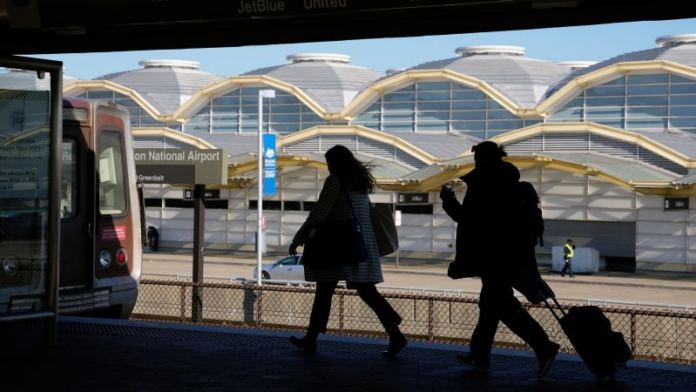CNN —
The House has passed a major federal aviation bill that aims to improve aviation safety, enhance protections for passengers and airline workers and invest in airport and air travel infrastructure nationwide.
The bill renewing the Federal Aviation Administration’s authority for five years will next head to President Joe Biden to be signed into law. The legislation passed the Senate last week. The House vote was 387 to 26.
The bill would authorize more than $105 billion in funding for the FAA, as well as $738 million for the National Transportation Safety Board for fiscal years 2024 through 2028.
Although the package has drawn broad bipartisan support, it touched off contentious debate over certain policy issues.
One flashpoint centered on a provision to add longer-distance flights at Reagan National Airport, just outside of Washington, DC. A group of Washington-area Democratic senators pressed to strip the provision from the package, though the chamber didn’t ultimately move to do so.
Some lawmakers argue additional flights would give consumers more choices and bring down prices, while others say it would increase congestion and delays at the airport, as well as create safety issues. Lawmakers commute most weeks between their home states and Washington, and many could benefit from more convenient flights back and forth.
Other key provisions of the legislation include:
Hiring more air traffic controllers
The bill would require the FAA to hire and train as many air traffic controllers as possible to close a gap of 3,000 vacancies. It would also mandate more research into how many controllers are needed at each tower and center and would increase access to training simulators in more air traffic control towers nationwide.
Improving runway safety
To reduce the number of collisions and near-collisions on runways, the FAA would be required to install additional runway technology at medium and large hub airports.
The technology is only installed at about three dozen US airports, according to the FAA, and played a role in alerting controllers that American Airlines and Delta Air Lines passenger jets were about to collide on a John F. Kennedy airport runway in New York City in January 2023.
Passenger protections
In April, the Department of Transportation finalized a new rule on airline refunds: They’re due in cash – rather than vouchers – within a few days, and come automatically. That means no requirement to call the airline and complain when your flight is canceled or substantially delayed.
The compromise FAA bill as proposed originally did not go as far as the new DOT rule, which raised the possibility that a future DOT leadership could strip the automatic refund rule. After an outcry – including from an alliance of Republican Sen. Josh Hawley of Missouri and Democratic Sen. Elizabeth Warren of Massachusetts – the bill’s negotiators returned to the drawing board and added the automatic component into the bill. Under the new language, if a passenger declines an airline’s rebooking request or does not respond to the request, the airline must issue an automatic refund.
Enhancing protections for airline workers
The legislation would put more teeth behind rules against attacks on aviation workers, which spiked during the Covid-19 pandemic, by expanding legal protections to ground-based employees like gate and check-in agents.
It would also enhance Transportation Security Administration-taught self-defense training for flight attendants so they can better protect themselves and respond to unruly passengers and other threats.
Setting a standard for travel credits
Under the bill, travel credits issued by airlines in lieu of refunds would have to be useable for at least five years.
Increasing cockpit voice recording
Commercial aircraft would have to carry 25-hour cockpit voice recorders under the legislation. That was a top ask of the NTSB and a substantial increase from the current two-hour standard.
The cockpit voice recorder is one of the two black boxes and is currently only required to capture two hours of sound from the cockpit. The NTSB says recordings that would be key to investigations have fallen outside the two-hour window and been overwritten.
House passes Federal Aviation Administration reauthorization bill
Recent Comments
on Iowa State starting RB Jirehl Brock among latest college football players charged in gambling probe
on The Rev. Al Sharpton to lead protest after Florida governor’s ban of African American studies course
on Sports World Hails ‘Superwoman’ Lindsey Vonn for Her Grand Comeback Despite Career-Changing Injury
on San Mateo County Community College District sues five companies over role in ‘pay to play’ scandal
on Saipan, placid island setting for Assange’s last battle, is briefly mobbed – and bemused by the fuss
on ‘Pokémon Scarlet’ and ‘Violet’ Fan Theories Suggest Legendary Time Travel, Alternate Dimension Plot
on Joe Manchin and Tommy Tuberville introduce bill on name, image and likeness rules for college sports
on Inside the Michael Jordan ‘Air’ movie, plus why NFL, others are buying into the sports film industry
on If you’re a frequent traveler, these wrap tops from Aday will revolutionize your on-the-go wardrobe
on How Does Jack Nicklaus Travel? Exploring the Private Jets Owned by the ‘Golden Bear’ Over the Years
on Hollywood Reporter: Tom Cruise negotiated with movie studios over AI before the actors strike began
on Ford Blue Cruise: US regulators investigate fatal crashes involving hands-free driving technology
on Dozens of boats cruise the Seine in a rehearsal for the Paris Olympics’ opening ceremony on July 26
on Devout athletes find strength in their faith. But practicing it and elite sports can pose hurdles
on Despite strong Lunar New Year holiday data, consumer spending in China isn’t roaring back just yet
on David and Victoria Beckham so ‘Charmed’ by Tom Cruise They Have His Photos on Display at Their Home
on CONCEPT ART: New Details Revealed for Disney Cruise Line Lookout Cay at Lighthouse Point Destination
on CBS Sports announces Matt Ryan will join NFL studio show. Longtime analysts Simms and Esiason depart
on Boston College vs. Army live stream, how to watch online, CBS Sports Network channel finder, odds
on Boise State vs. Air Force live stream, odds, channel, prediction, how to watch on CBS Sports Network
on Biden to tout bill’s prescription drug prices, energy provisions in pitch to Americans, aide says
on After UFC Fallout, Conor McGregor Offers a Valuable Piece of Advice to Free Agent Francis Ngannou
on 2024 Super Bowl: CBS Sports Network and CBS Sports HQ to combine for 115 hours of weeklong coverage
on ‘Best Intention’: Chris Kirk Has Absolute Trust in Jay Monahan and PGA Tour’s Widely Debated Model
on 2023 NFL All-Rookie Team: CBS Sports draft expert, former GM unveil league’s best first-year players
on “Completely Knocked Me Out”: Rob Lowe Recalls Boxing Match With Tom Cruise On 1983 Brat Pack Classic
on CONCEPT ART: New Details Revealed for Disney Cruise Line Lookout Cay at Lighthouse Point Destination
on “Completely Knocked Me Out”: Rob Lowe Recalls Boxing Match With Tom Cruise On 1983 Brat Pack Classic
on CBS Sports announces Matt Ryan will join NFL studio show. Longtime analysts Simms and Esiason depart
on Carlos Sainz’s Soccer Fanboy Emerges as Spaniard Shares Defining Moment With This Real Madrid Legend
on Biden: ‘At this point I’m not’ planning to visit East Palestine, Ohio, after toxic train derailment
on ‘Best Intention’: Chris Kirk Has Absolute Trust in Jay Monahan and PGA Tour’s Widely Debated Model
on Ahead of big sports weekend, dispute with Disney leaves millions of cable subscribers in the dark
on A heavy wave of Russian missile attacks pounds areas across Ukraine, killing at least 4 civilians
on 2024 Super Bowl: CBS Sports Network and CBS Sports HQ to combine for 115 hours of weeklong coverage
on 2023 NFL All-Rookie Team: CBS Sports draft expert, former GM unveil league’s best first-year players
on Army vs. Coastal Carolina live stream, how to watch online, CBS Sports Network channel finder, odds
on AL Rookie of the Year Julio Rodriguez Spreads Joy and Sportsmanship to the Youth of Loma de Cabrera
on After UFC Fallout, Conor McGregor Offers a Valuable Piece of Advice to Free Agent Francis Ngannou
on Dubai International Airport sees 41.6 million passengers in first half of year, more than in 2019
on Devout athletes find strength in their faith. But practicing it and elite sports can pose hurdles
on Despite strong Lunar New Year holiday data, consumer spending in China isn’t roaring back just yet
on Dave Portnoy: Taylor Swift’s security should ‘drag Kim Kardashian to jail’ if she attends Eras Tour
on CONCEPT ART: New Details Revealed for Disney Cruise Line Lookout Cay at Lighthouse Point Destination
on “Completely Knocked Me Out”: Rob Lowe Recalls Boxing Match With Tom Cruise On 1983 Brat Pack Classic
on CBS Sports, Serie A announce new TV rights deal; Paramount+ to air over 400 Italian soccer matches
on Cam Newton’s Violent Public Incident Draws Hilarious Reaction From 3x All-Star: “Where Do I Sign Up
on Boston College vs. Army live stream, how to watch online, CBS Sports Network channel finder, odds
on Angel Reese Launches Foundation Dedicated To Empowering Women Through Sports & Financial Literacy
on A weaker dollar, skyrocketing prices and ‘record’ visitor numbers: Good luck in Europe this summer




